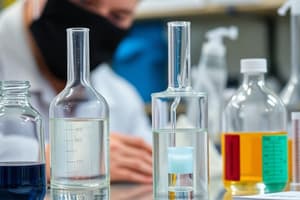Podcast
Questions and Answers
वैज्ञानिक विधि का प्राथमिक लक्ष्य क्या है?
वैज्ञानिक विधि का प्राथमिक लक्ष्य क्या है?
- प्राकृतिक दुनिया को एक बेहतर तरीके से समझना (correct)
- अबाधित डेटा संग्रह करना
- सिर्फ प्रयोगों का संचालन करना
- सिद्धांतों को जन्म देना
कौन सा चरण वैज्ञानिक प्रक्रिया का एक महत्वपूर्ण भाग नहीं है?
कौन सा चरण वैज्ञानिक प्रक्रिया का एक महत्वपूर्ण भाग नहीं है?
- अवज्ञा करना (correct)
- परिकल्पना का निर्माण
- व्यवस्थित अवलोकन
- डेटा संग्रह
परिकल्पना के परीक्षण का कौन सा चरण है?
परिकल्पना के परीक्षण का कौन सा चरण है?
- निष्कर्ष का निर्माण
- अध्ययन रिपोर्ट
- परिकल्पना की पुष्टि
- प्रयोगात्मक परीक्षण (correct)
साझा करने और निष्कर्ष पहुंचाने की प्रक्रिया को क्या कहा जाता है?
साझा करने और निष्कर्ष पहुंचाने की प्रक्रिया को क्या कहा जाता है?
निम्नलिखित में से कौन सा विज्ञान की शाखा नहीं है?
निम्नलिखित में से कौन सा विज्ञान की शाखा नहीं है?
स्वतंत्र और विविधता चर का परीक्षण करने में क्या किया जाता है?
स्वतंत्र और विविधता चर का परीक्षण करने में क्या किया जाता है?
वैज्ञानिक सिद्धांतों के बारे में क्या सच है?
वैज्ञानिक सिद्धांतों के बारे में क्या सच है?
वैज्ञानिक नियमों का क्या महत्व है?
वैज्ञानिक नियमों का क्या महत्व है?
Flashcards
Scientific Method
Scientific Method
A systematic approach to understanding the natural world using observation, experimentation, and the development of theories.
Observation
Observation
Noticing something in the natural world through your senses.
Hypothesis
Hypothesis
A testable explanation for an observation.
Independent Variable
Independent Variable
Signup and view all the flashcards
Dependent Variable
Dependent Variable
Signup and view all the flashcards
Biological Sciences
Biological Sciences
Signup and view all the flashcards
Physical Sciences
Physical Sciences
Signup and view all the flashcards
Scientific Theory
Scientific Theory
Signup and view all the flashcards
Study Notes
Scientific Method
- Science is a systematic approach to understanding the natural world through observation, experimentation, and the development of theories.
- The scientific method involves a cyclical process of inquiry, incorporating variables, hypotheses and data analysis.
- Observation: Noticing phenomena in the natural world.
- Questioning: Asking specific and testable questions about observations.
- Hypothesis Formation: Proposing a testable explanation for the observed phenomenon.
- Prediction: Forecasting the expected outcome of an experiment if the hypothesis is correct.
- Experimentation: Testing the hypothesis through controlled experiments designed to measure variables.
- Data Collection: Gathering and recording the results of the experiment.
- Data Analysis: Interpreting the data gathered to determine whether the hypothesis is supported or rejected.
- Conclusion: Determining whether the hypothesis was supported or rejected based on the collected and analyzed experimental data.
- Communication: Sharing findings and conclusions with the broader scientific community through presentations and publications.
- Scientific theories are well-substantiated explanations of aspects of the natural world that are based on a large body of evidence and have stood up to rigorous testing.
- Scientific laws describe fundamental relationships in nature that are consistently observed to be true.
Branches of Science
- Biological Sciences: Examine living organisms, including botany (plants), zoology (animals), microbiology (microorganisms), and genetics (heredity).
- Physical Sciences: Investigate non-living matter and energy, including physics (matter and energy), chemistry (structure and properties of matter), and astronomy (celestial objects).
- Earth and Environmental Sciences: Study Earth's systems and processes and their interactions. These include geology (Earth's composition), meteorology (weather), oceanography (oceans), and environmental science (interactions of humans and the environment).
- Other disciplines often categorized as interdisciplinary include cognitive science, materials science, and computer science.
Scientific Concepts
- The scientific method is a key concept in science.
- Observation is crucial for generating questions and hypotheses.
- Variables play a pivotal role in experiments; independent variables are manipulated, dependent variables are measured, and controlled variables remain constant.
- Measurements and data play an important role in the interpretation of experiments.
- Theories and laws are constantly being revised and expanded as new data emerges.
- Skepticism and peer review are important elements in the scientific process.
The Importance of Science
- Science addresses fundamental questions about the universe and our place within it.
- Science is essential for understanding the natural world and for solving problems facing society.
- It is crucial in technology development, medicine and healthcare, and environmental stewardship.
- Science relies on critical and systematic thinking.
- Scientific literacy is essential to make informed decisions as global citizens.
Studying That Suits You
Use AI to generate personalized quizzes and flashcards to suit your learning preferences.




